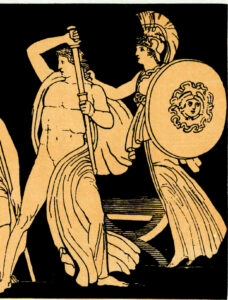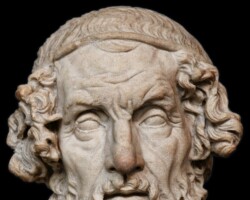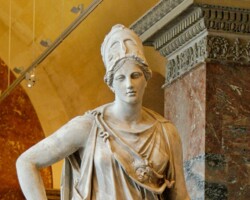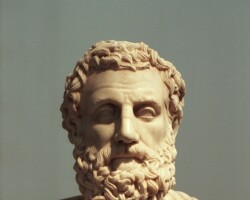Prudence
 Definition and Explanation
Definition and Explanation
- Catechism of the Catholic Church, point 1806:
- "Prudence is the virtue that disposes practical reason to discern our true good in every circumstance and to choose the right means of achieving it."
- Thomas Aquinas' Summa Theologiae, IIaIIae, question 47:
- Prudence is right reason applied to action and, therefore, is the perfection of the practical reason, which considers things done for an end.
- Prudence is wisdom about human affairs, but not wisdom per se because wisdom per se is about God.
- Aristotle's Rhetoric, Book I, Chapter 9:
- "Prudence is that virtue of the understanding which enables men to come to wise decisions about the relation to happiness of the goods and evils that have been previously mentioned," i.e. happiness, the virtues, bodily excellence, wealth, friendship, intellectual excellence, etc.
Examples from Western History and Literature

Odysseus’ Praise of Penelope
“Lady, no mortal man on the endless earth could have cause to find fault with you; your fame goes up into the wide heaven, as of some king who, as a blameless man and god-fearing, and ruling as lord over many powerful people, upholds the way of good government, and the black earth yields him barley and wheat, his trees are heavy with fruit, his sheepflocks continue to bear young, the sea gives him fish, because of his good leadership, and his people prosper under him.” (Odyssey 19.107-114)

Athena Mentoring Telemachus
I will urge you to consider some means by which you can force the suitors out of your household. Come now, pay close attention to me and do as I tell you. Tomorrow, summon the Achaian warriors into assembly and publish your word to all, let the gods be your witnesses. Tell the suitors to scatter and go back to their own holdings, and as for your mother, if the spirit urges her to be married, let her go back to the palace of her powerful father, and they shall appoint the marriage and arrange for the wedding presents in crates amount, but for yourself, I will counsel you shrewdly, and hope you will listen… You should not go on clinging to your childhood. You are no longer of an age to do that… so you too dear friend, since I can see you are big and splendid, be bold also, so that in generations to come they will praise you… So spoke the goddess grey-eyed Athena, and there she departed like a bird soaring high in the air, but she left in his spirit of determination and courage, and he remembered his father even more than he had before, and he guessed the meaning, and his heart was full of wonder, for he thought it was a divinity. At once he went over, a godlike man, to sit with the suitors. ("The Odyssey" 1.269-324)

Athena to the Furies
I will not where are you telling the good things I offer, so that you can never say that you, an elder dod, we’re driven unfriended from the land by me in my youth, and by my mortal citizens. But if you hold Persuasion has her sacred place of worship, in the sweet beguilement of my voice, and you might stay with us, but if you wish to stay then it would not be justice to inflict your rage upon the city, your resentment or bad luck to armies. Yours the barrens portion in this land if you will, in all justice, with full privilege. (Eumenides, 881-891)

Cardinal Morton in "Utopia"
While there I was much obliged to than most Reverend Father John Morton, Cardinal Archbishop of Canterbury, and at that time also Lord Chancellor of England. He was and then, my dear Peter (for More already knows what I am about to say) no more venerable for his authority than for his prudence and character. He was of medium height, not stooped over though he was of an advanced age. His looks inspired reverence, not fear. In company he was not standoffish, but grave and serious. Sometimes he enjoying handling suitors roughly, but harmlessly, so as to gauge the intelligence and presence of mind each would display. He was delighted with such qualities, provided they were devoid of all imprudence mama since they were related to his own character, and he embraced them as valuable in getting things done. His speech was polished and pointed; he was very skilled in the law; his intelligence was incomparable; his memory was so excellent as to be prodigious. These extraordinary natural gifts he had improved by study and practice. The king seems to relied very much on his advice and while I was there he seemed to be the mainstay of the Commonwealth. This was not surprising: thrust immediately from school into the court at a very young age, active and important affairs throughout his life, continually world about by violent changes of fortune, he had learned practical wisdom in the next of many and serious parables, and wisdom so won is not easily forgotten.

Erasmus on Thomas More
For More says he owes to his literary studies his much better health, his popularity and influence with an excellent prince and all men both friends and strangers, his own greater happiness and happiness he gives his friends, the services he can now rendered to his country and his relations and kinsfolk, and a greater ease in pleasing heaven. At first liberal studies had a bad name for depriving their devoted adherents to the common touch. There is no journey, no business however voluminous or difficult, that can take the book out of Morris hand; and yet it would be hard to find anyone who is more truly a man for all seasons and all men, who was more ready to oblige, more easily available for meeting, more lively conversation, or who combined so much real wisdom with such charm of character.
